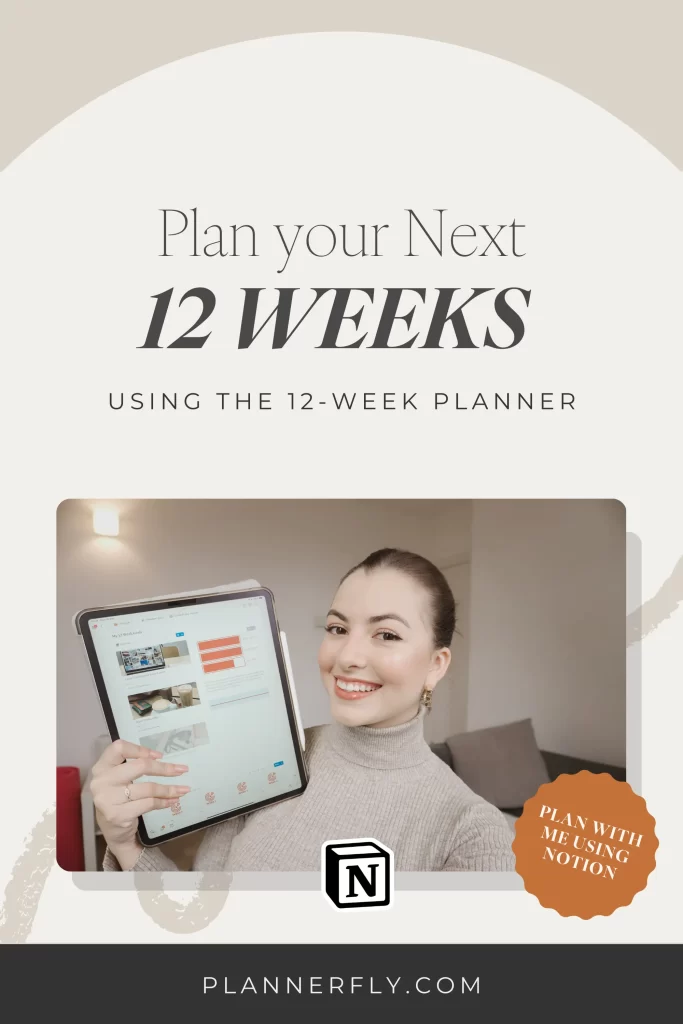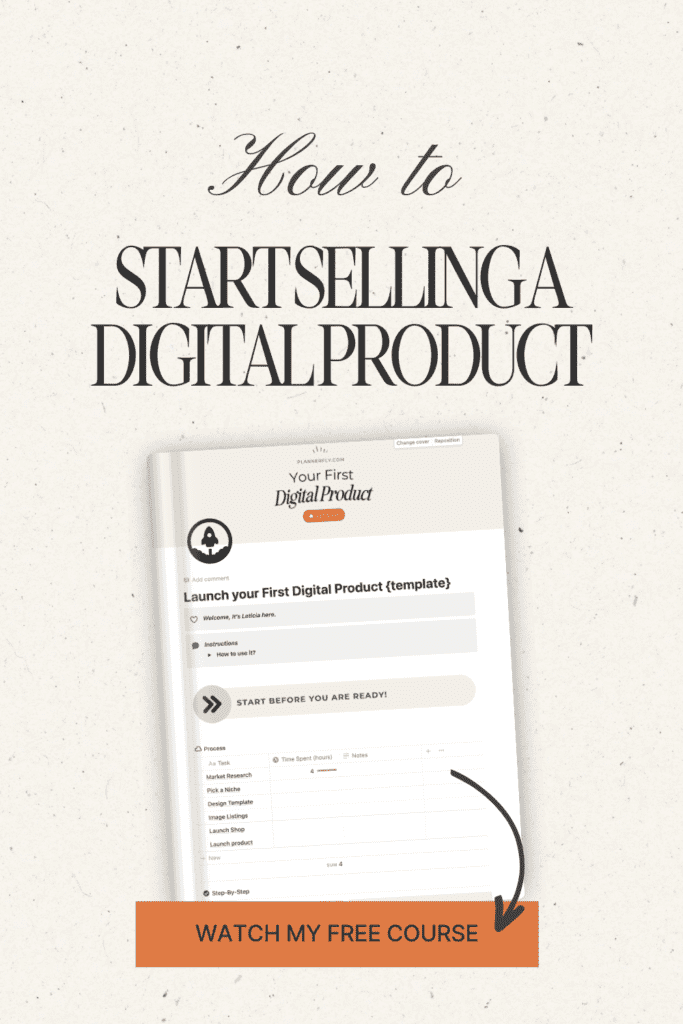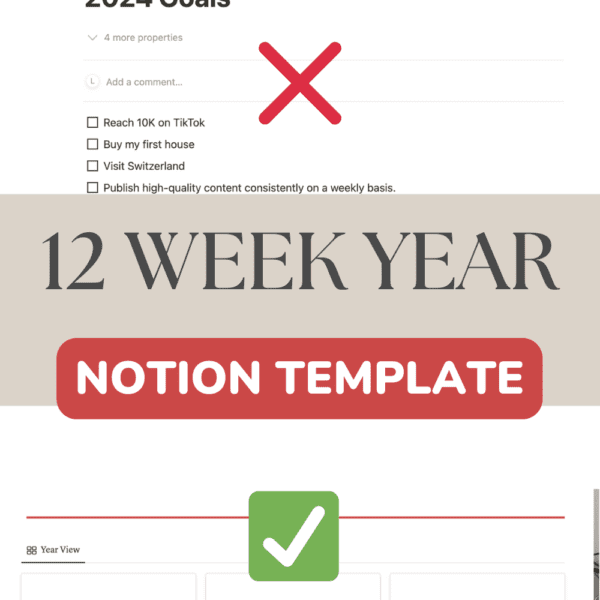Discover how to use the 12 Week Year planning method with Notion to achieve more in less time. Learn my step-by-step process for goal setting.
Do you ever feel like there’s too much on your plate and not enough time to get it all done? I’ve been there. But what if I told you that you can achieve more in 12 weeks than most people accomplish in a full year? Sounds too good to be true? Not at all!
Let me walk you through the exact method that has kept me focused and productive for almost two years now—one that works wonders for my creative mind and helps me stay on track with both my personal and business goals.
What is the 12-Week Year?
The 12-Week Year, a concept created by Brian Moran and Michael Lennington, is a goal-setting and execution method that encourages you to treat 12 weeks as your year.
I know you’ve probably seen this book going viral on TikTok (because that’s exactly where I first came across it), but it’s much more than a passing trend.
The idea is simple: by focusing on a smaller timeframe, you intensify your efforts and avoid the pitfalls of procrastination.
After testing and tweaking this method multiple times, I’ve seen firsthand how effective it is—even when I don’t fully hit my goals. For example, during Q3, I didn’t reach all my targets, but I was overly ambitious, given that it was summer and I took time off to enjoy the sun. (I live in the UK, where sunny days are a rarity!) But that’s the beauty of the 12-Week Year—you can start fresh whenever you’re ready.
You don’t have to wait until the first of the month or the start of the year to set your goals.
The Power of Planning Your Goals with Notion
As someone who loves to stay organized, I’ve made a few adjustments to the traditional 12-Week Year method and created a Notion template to help me plan my life and business goals. I’ve even developed a few different versions of this template that I share with my students in the Passive Income Academy, so they can customize it for themselves or resell it to their community.
Today, I’ll be sharing the exact one I’m using right now and showing you how to structure your next 12 weeks for success.
Step 1: Get Clarity on Your Goals
One of the first things I do when setting my 12-week goals is to use ChatGPT to help break everything down into smaller, actionable steps. For example, my main goal for Q4 is to launch a passive funnel for my online courses, with a target of $1,000 in course sales on autopilot. Alongside that, I want to post one YouTube video per week, each accompanied by a blog post on my website, and launch a Black Friday offer. Oh, and on the personal front, I’m focusing on my fitness by working to build my shoulders and biceps through CrossFit.
When planning, it’s essential to focus on things within your control. Ask yourself, “What can I do to make these goals a reality?” Then, start breaking those larger goals into weekly tasks. ChatGPT can be a great tool for this, but remember: it’s your life and routine, so adjust the tasks until they feel doable for you.
Step 2: Structure Your Execution Plan
A plan is only as good as its execution. Once I’ve nailed down my goals, I structure a plan to make them happen. This is where time-blocking becomes a game-changer for me. Instead of trying to juggle multiple tasks each day, I dedicate specific days to specific activities.
For instance, Mondays and Tuesdays are my YouTube days, where I focus on content creation. Wednesdays are for my funnel and online courses, and Thursdays are reserved for other business activities, while Fridays are for admin work.
If you’re working a 9-5 job or have limited time, be honest with yourself about what’s realistic. Make sure your weekly plan fits into your lifestyle, so you don’t burn out.
Step 3: Use Your Notion Template to Stay Organized
The best part about this whole process is using my 12-Week Year Notion template to keep everything organized.
Each goal and task is synchronized, so I can see exactly what I need to do each week. This reduces the mental load and allows me to focus on execution rather than constantly worrying about what’s next.
For example, when I set a task like “publish a YouTube video and blog post,” I assign it to Week 1. That way, when I log into Notion, I can immediately see all my tasks for the week without wasting time figuring out what needs to be done.
Step 4: Track Your Progress Weekly
One of the things that makes the 12-Week Year so effective is its built-in accountability. I love the weekly planner section of my Notion template because it allows me to track my progress every week.
By the halfway point (Week 6), I can already tell if I’m on track to hit my goals. If I’m consistently hitting 80% or more of my tasks, I know I’m in a good place to achieve success. If I’m falling behind, I know I need to adjust my strategy.
Step 5: Build a Vision Board for Motivation
Vision boards are a powerful tool for keeping your motivation high throughout the 12-week period. I mix in things I’ve already achieved with things I want to manifest. For example, I added a picture of a car to my vision board, and not long after, my husband and I ended up buying a similar car—completely unplanned! Seeing those wins on your vision board gives you a boost and reminds you that your goals are within reach.

Final Thoughts: It’s Time to Take Action
Now that you’ve got the framework, it’s time to take action. I encourage you to spend the next few minutes using ChatGPT (or your own brainstorming tools) to plan your goals for the next 12 weeks. Once you’ve done that, jump back into Notion and start organizing your tasks in a way that makes sense for you.
If you’re interested in the 12-Week Year Notion template I’m using, you can grab it from my website. It’s a private label rights (PLR) template, meaning you can customize it and resell it as your own, or simply use it to organize your personal and business life.
So, are you ready to crush your next 12 weeks? Let’s make the most of this time and hit those goals before the year is out!
Download this Free Notion Template: Guide to Start a Digital Product Business in 4 days



